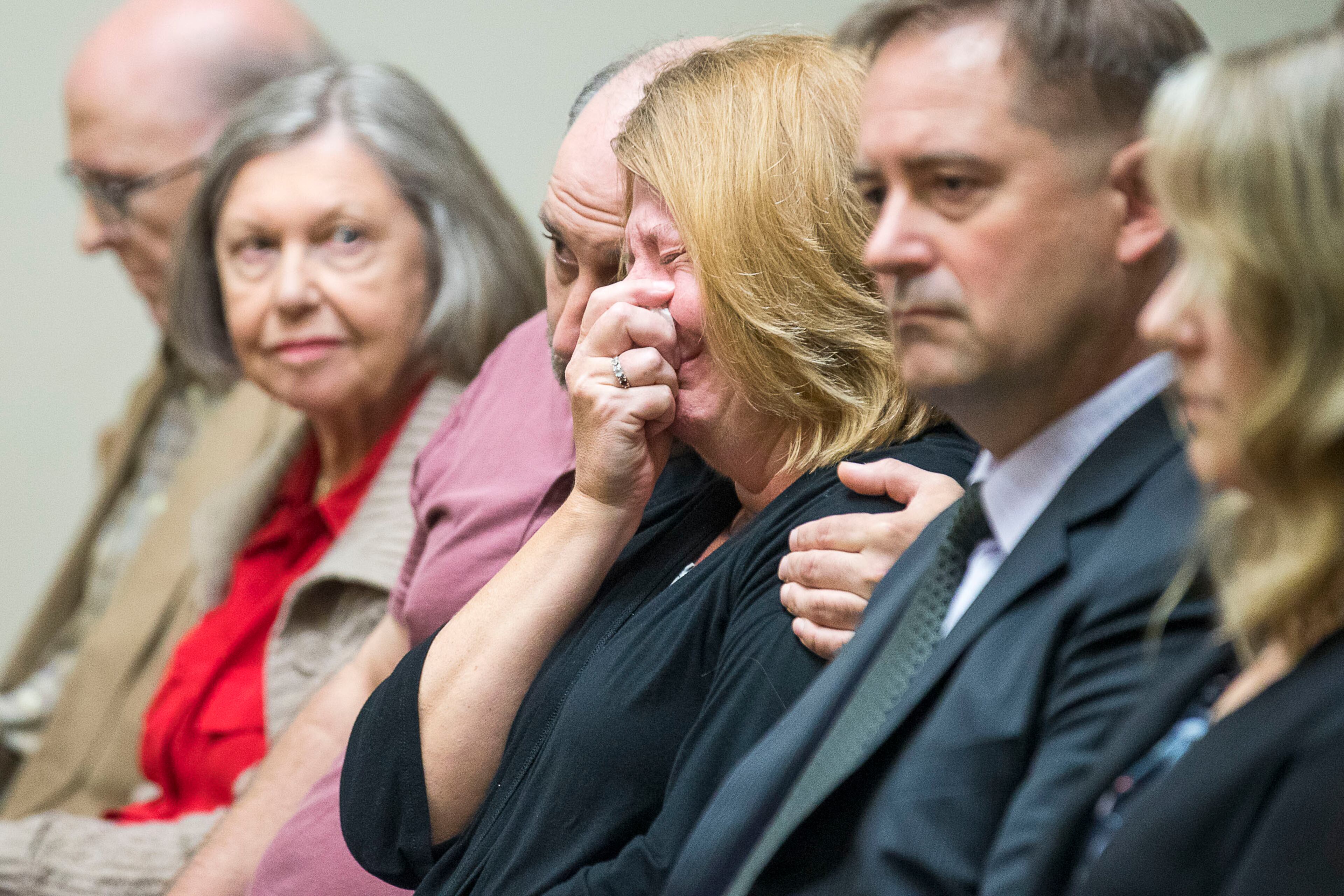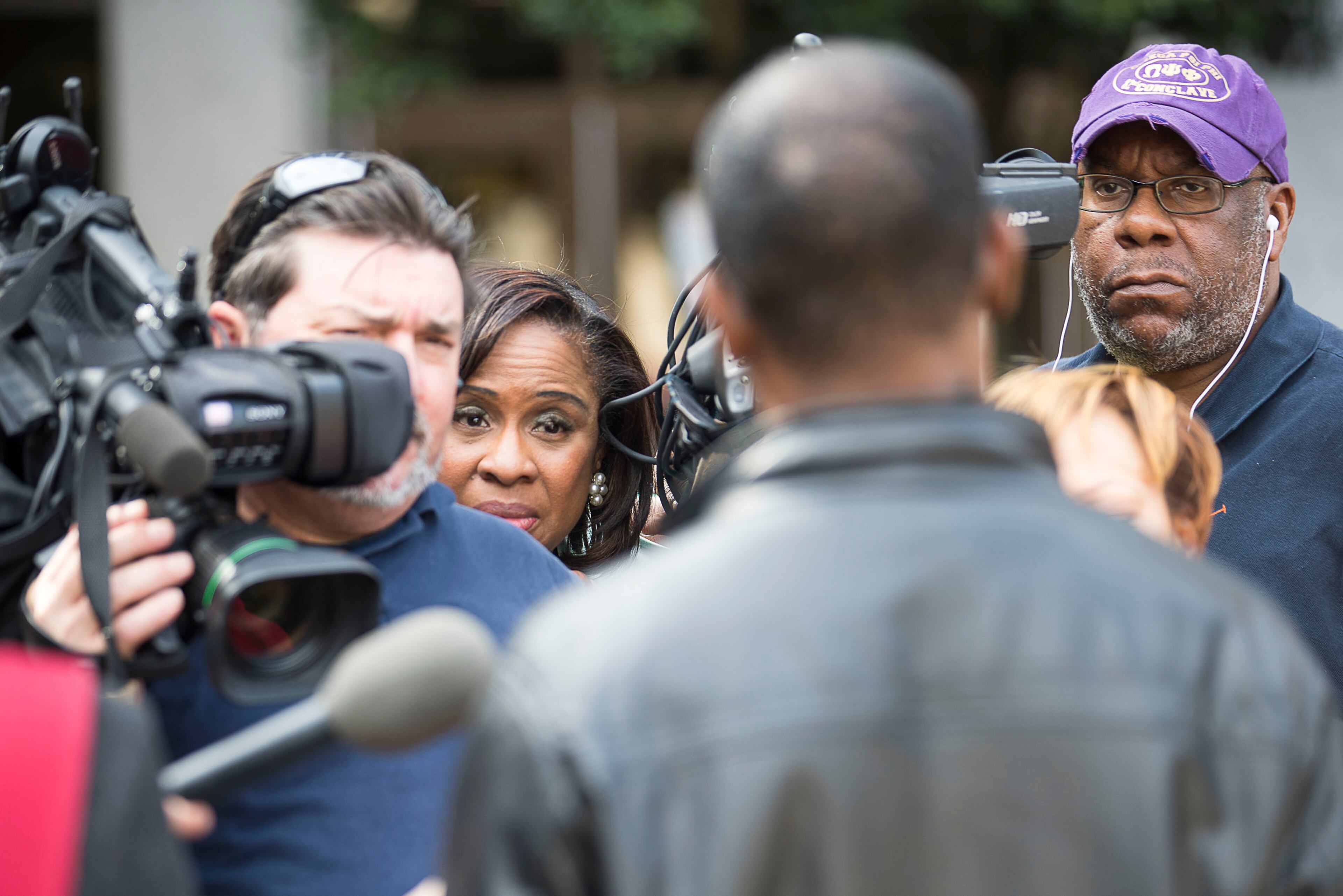‘No! No! No!’ — Olsen jury’s verdict satisfies neither side
It was a split verdict that seemed to please no one — including some of the jurors who reached it.
Former DeKalb County police officer Robert “Chip” Olsen wept upon hearing he had been found not guilty on two felony murder counts, each carrying a sentence of life in prison. But what started as tears of relief were canceled out by the inconsolable wailing of his wife, Kathy, as the jury forewoman pronounced her husband guilty on the four lesser felony charges — two counts of violation of oath of office, and one count each of aggravated assault and making false statements.
“No! No! No!” Kathy Olsen cried, prompting a deputy to escort her out of the courtroom. She could still be heard sobbing outside.
For the family of Anthony Hill, the Afghanistan War veteran killed by Olsen on March 9, 2015, the verdict was disappointing but expected.
As the verdict was being read, two jurors cried. They had deliberated for 27 hours over six days and, according to one juror, the discussions were often contentious.

“There was only so much I could do. I was disturbed,” said Juror 31, the only African-American man on the jury. “At some point in time, just hearing him say self-defense and hearing people in my (jury) saying self-defense was … one of the hardest things that any man of color could endure.”

Juror 31, a forklift operator from Lithonia, said he believed Olsen, 57, should have been convicted of murder but compromised when fellow jurors agreed to convict on the lesser charges.
“A naked man doesn’t pose a threat to a trained cop,” he told reporters. “When we call a cop, we expect a cop to de-escalate a situation, not turn to the most deadliest arsenal on his belt. And that’s where he went wrong.”
Those circumstances led many observers to predict an easy win for the prosecution. Olsen said he shot Hill, 26, out of fear for his safety, though none of the eyewitnesses who encountered Hill in the moments before the shooting said they found him threatening. The racial component only hardened opinions — Olsen is white; Hill is black.

According to Juror 31, race played a role in the 7-woman, 5-man panel’s decisions. The jurors included five whites and five blacks.
A majority of the African American jurors wanted Olsen convicted of murder, Juror 31 said. In the end, they compromised.
One black woman juror broke down, he said, when she realized there would be no conviction on the felony murder counts.
“I let her know that we can be part of something that could make a change, or we’re not going to be part of something that makes a change,” he said.
But just because Olsen spent Monday night in his home doesn’t mean he’ll avoid prison. In fact, he could serve up to 35 years if DeKalb Superior Court Judge LaTisha Dear Jackson gives him the maximum penalty on each of the four guilty counts. She released Olsen on $80,000 bond, had him fitted with an ankle monitor and imposed a 7 p.m. curfew.
Sentencing is scheduled for Nov. 1.
Juror 31 said he believes Olsen deserves significant prison time. The turning point for him: Officer Lyn Anderson’s testimony that Olsen told him he shot Hill because Hill was pounding on him, when everyone at the scene said Hill never touched Olsen.
» PHOTOS: OLSEN MURDER TRIAL — VERDICT DAY
“Once you lie, it’s hard to believe anything else,” Juror 31 said. “That’s what I was going off — the lies and the lies and the lies. It helped me make my decision a lot more quickly.”
Olsen, he said, was miscast as a police officer.
“Because he doesn’t know how to de-escalate a situation like that, cops like him don’t need to be out on the street,” the juror said. “Cops that are ready to go from zero to 10 very quickly? We don’t need cops like that. We need cops who will think from zero to one, two, three, four, five. Not zero to 10. He went from zero to 10, and he had plenty of time to de-escalate the situation. And that’s the problem we have in America.”

The question of police accountability loomed over the proceedings. Two days before the Olsen jury began deliberations, a Dallas, Texas, jury sentenced Amber Guyger to 10 years in prison for fatally shooting her black neighbor in his apartment.
Four days later, a jury in Camden County, Georgia, acquitted a white cop of manslaughter in the 2018 shooting death of an unarmed black man. The victim was shot in the back eight times as he ran from the officer.

Attorney Chris Stewart, who has represented several families of people shot and killed by law enforcement, said the Olsen verdict shouldn’t be viewed as another blow to police accountability.
Dear Jackson’s sentence will ultimately determine that, he said.
“I don’t really care about the charge, I care about the time,” Stewart said. “Potentially (Olsen) will serve more time than (Guyger), and she was found guilty of murder.”
» PHOTOS: Olsen Murder Trial Week Three
DeKalb District Attorney Sherry Boston, who inherited the Olsen case from her predecessor, Robert James, said she was grateful jurors “found accountability for the death of Anthony Hill in this case so that we can have justice.”
Boston disputed critics who said the state overcharged Olsen.
“Certainly we charged felony murder because we believed in felony murder,” she said. “My team worked very hard to prove to this jury that murder and felony murder were the right outcomes. But I respect the fact that this jury deliberated very thoughtfully and they came to the decision that they thought was best.”

The DA acknowledged the difficulty in prosecuting police officers. When Olsen was indicted in January 2016 it had been at least five years since a Georgia police officer went on trial for fatally shooting a civilian.
“My team did a fabulous job in outlining what we thought was a case that made sense to hold an officer accountable,” Boston said. “And we are grateful in finding this officer guilty of four counts. This jury did speak to that accountability and did find that he was responsible for the death of Anthony Hill.”

Lead defense attorney Don Samuel said he was “incredibly relieved the jury acquitted Olsen on murder charges.
“The jury got it exactly right on murder,” he said. “But we’re obviously disappointed they convicted him on the other counts.”
» PHOTOS: Olsen Murder Trial Week Two
The 20-day trial concluded with Olsen being led from court to post bond. Lead prosecutor Pete Johnson had argued against what he called preferential treatment for the former cop.
“He is now a convicted felon,” Johnson said. “… You should put handcuffs on this convicted felon and take him into custody because that’s where he belongs.”
“You want me to put handcuffs on him?” Dear Jackson asked, prompting Johnson to say he was speaking metaphorically.
Samuel reminded the judge that Olsen has been out on bond for more than three years without issue.
» PHOTOS: Olsen Murder Trial Week One
Dear Jackson explained her decision to Hill’s family.
“I’m not saying that Anthony Hill death was in vain,” the judge said. If Olsen had been convicted of murder, she said, “we probably wouldn’t be having this conversation.”
She then told Olsen not to read anything into her decision to let him remain free until Nov. 1.
Don’t think you won’t be receiving any jail or prison time, the judge said.



